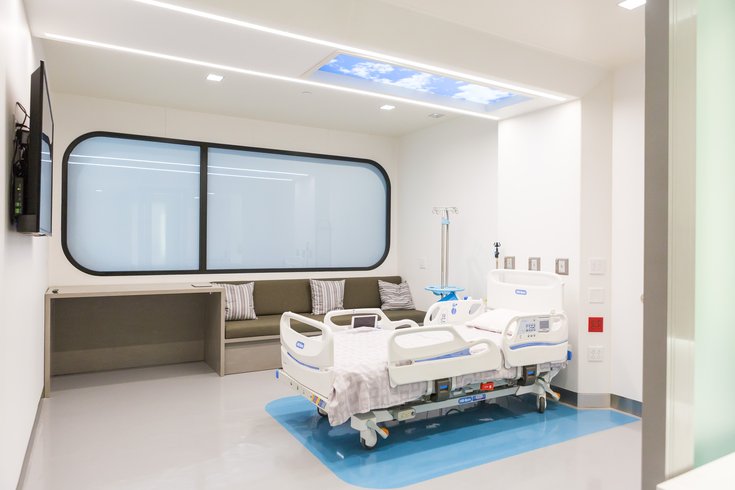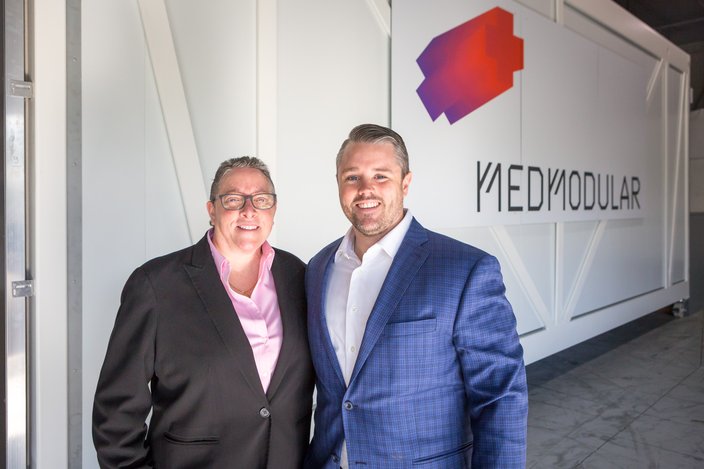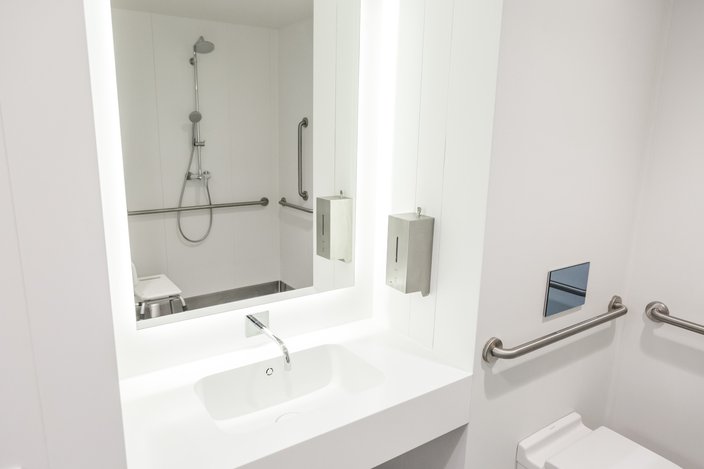
December 05, 2018
 Thom Carroll/PhillyVoice
Thom Carroll/PhillyVoice
EIR Healthcare, a Philadelphia startup, develops prefabricated, modular hospital rooms that incorporate smart technology, including touchless doors, antimicrobial surfaces, bedside iPads and a patient engagement portal. Hospitals can save both construction costs and time by opting for the modular units, which can be stacked on top of one another as high as 10 stories.
Gunter Geiger did not expect to remain in a German hospital for more than a few days.
Six months later, he finally left the European country with surgically-repaired eyes. But he also brought home an entirely new vision.
Geiger believed he could design a hospital that operated far more efficiently than the one he entered.
"Whenever you tell an engineer to sit down and not do anything for two or three days and recover, naturally the first thing they do is get up and start tinkering with things," said Patrick Fenningham, chief product officer at EIR Healthcare, a Philadelphia-based startup.
"He turned a three-day hospital stay into a six-month project where he befriended the CEO of the hospital and identified the inefficiencies in the way the hospital is laid out."
Geiger died three years ago. But his son, Grant Geiger, took on the project, founding EIR Healthcare and designing prefabricated, modular hospital rooms infused with smart technology.
EIR Healthcare unveiled a prototype of its first modular hospital room in October, which the company is billing as the "hospital of the future." The room is designed to prevent falls, reduce infections and enhance patient care.
The company completed the design for a series of modular hospital rooms, including examination and operating rooms, earlier this year. But Fenningham said modular designs are relatively foreign within the healthcare industry, initially making their product difficult to envision. Others questioned the quality of using prefabricated units.
"People couldn't get their heads around it," Fenningham said. "So what we did – we physically built a prototype and said, 'OK, all of your concerns, come and look at it. We'll be able to educate you.'"
The room features touchless doors, Corian surfaces and automatic bathroom fixtures – all designed to prevent microbial infections. Continuous epoxy floors with floor-to-wall radius transitions hold the same benefit.
"It's easier to clean," Chief Clinical Officer Mauri Lawler said. "You can't get a broom or a mop into that sharp corner. This makes it a lot smoother."
Mauri Lawler, left, chief clinical officer of EIR Healthcare, and Patrick Fenningham, chief operating officer, stand beside a prototype of the company's modular hospital room.
Additionally, a series of grab bars and an open shower plan are designed to limit falls.
Future versions will come equipped with higher-level technologies, including bedside iPads and a patient engagement portal capable of displaying patient charts and care plans.
Having such information readily available helps patients and their families maintain a better understanding of their conditions and their treatments, Lawler said.
"Our cost-per-square foot is very competitive with traditional construction projects. Where we're going to offer the dollar savings is really in the time. We can probably get a project finished 30-to-40 percent faster...." – Mauri Lawler, chief clinical officer, EIR Healthcare
"We wanted to educate, to teach, to engage the patients in really as many aspects of their care as we can," Lawler said. "All of that leads to better outcomes – and certainly a better total experience, which is what the hospitals are relying on from a reimbursement standpoint."
Eventually, radio-frequency identification (RFID) technology could be incorporated to identify caregivers before they enter a patient's room.
"At some point, a doctor can hit their badge before they enter the room," Lawler said. "Now, I see his picture (and think), 'Oh, he's my cardiologist.' Because if I'm sick, I may not remember who he is, or if I'm elderly."
But will health care networks buy into modular hospital design?
Hospitals can save both construction costs and time by opting for a modular design, Fenningham said. EIR Healthcare's modular units are self-stabilizing and can be stacked on top of one another as high as 10 stories. Or they can be slid into steel superstructures.
"Once they're slid in, it's legitimate plug-and-play," Fenningham said. "You plug the mechanical and electrical and plumbing into the core of the building and you just build them out that way."
The bathroom in EIR Healthcare's 'smart' hospital room includes a Corian sink designed to limit infections and many grab bars designed to prevent falls.
Modular design has become more popular among the hotel industry, Fenningham said. But EIR Healthcare envisions its units being used to build specialty hospitals, urgent care centers and even facilities needed to aid natural disaster recovery.
The company is negotiating with a few health care networks within the United States, Fenningham said. Pricing varies by project but begins at $500 per square foot.
"Our cost-per-square foot is very competitive with traditional construction projects," Lawler said. "Where we're going to offer the dollar savings is really in the time. We can probably get a project finished 30-to-40 percent faster, allowing a hospital to be able to gather that revenue that much quicker."
As evidence, Fenningham points to the prototype.
It took about 28 days for the manufacturer, Admares, to construct the unit and another 10 days for it to ship from Europe.
"We always joke," Fenningham said, "that our 363-square-foot mod arrived quicker than my standard-shipping Amazon order."
Follow John & PhillyVoice on Twitter: @WriterJohnKopp | @thePhillyVoice
Like us on Facebook: PhillyVoice
Add John's RSS feed to your feed reader
Have a news tip? Let us know.
 Thom Carroll/PhillyVoice
Thom Carroll/PhillyVoice Thom Carroll/PhillyVoice
Thom Carroll/PhillyVoice